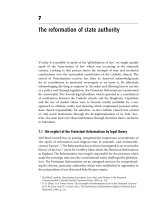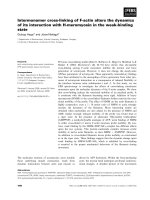The privatization of israel the withdrawal of state responsibility
Bạn đang xem bản rút gọn của tài liệu. Xem và tải ngay bản đầy đủ của tài liệu tại đây (4.64 MB, 425 trang )
The Privatization of Israel
Amir Paz-Fuchs · Ronen Mandelkern
Itzhak Galnoor
Editors
The Privatization
of Israel
The Withdrawal of State Responsibility
Editors
Amir Paz-Fuchs
Sussex Law School
University of Sussex
Brighton, UK
Itzhak Galnoor
The Van Leer Jerusalem Institute
Jerusalem, Israel
Ronen Mandelkern
School of Political Science,
Government and International
Affairs
Tel Aviv University
Tel Aviv-Yafo, Israel
ISBN 978-1-137-60156-8
ISBN 978-1-137-58261-4 (eBook)
/>Library of Congress Control Number: 2018934676
© The Editor(s) (if applicable) and The Author(s) 2018
This work is subject to copyright. All rights are solely and exclusively licensed by the
Publisher, whether the whole or part of the material is concerned, specifically the rights
of translation, reprinting, reuse of illustrations, recitation, broadcasting, reproduction
on microfilms or in any other physical way, and transmission or information storage and
retrieval, electronic adaptation, computer software, or by similar or dissimilar methodology
now known or hereafter developed.
The use of general descriptive names, registered names, trademarks, service marks, etc. in this
publication does not imply, even in the absence of a specific statement, that such names are
exempt from the relevant protective laws and regulations and therefore free for general use.
The publisher, the authors and the editors are safe to assume that the advice and
information in this book are believed to be true and accurate at the date of publication.
Neither the publisher nor the authors or the editors give a warranty, express or implied,
with respect to the material contained herein or for any errors or omissions that may have
been made. The publisher remains neutral with regard to jurisdictional claims in published
maps and institutional affiliations.
Cover credit: Tjasa Krivec/Peter Lane/Alamy Stock Photo
Printed on acid-free paper
This Palgrave Macmillan imprint is published by the registered company Nature America,
Inc. part of Springer Nature
The registered company address is: 1 New York Plaza, New York, NY 10004, U.S.A.
Preface
Is there a completely private good in the sense that there is no governmental
involvement whatsoever in owning, financing, delivering and regulating it?
I suppose we can construe several examples such as jewelery, assuming that
even the materials used are not subject to some regulation. Is there a completely public good in the sense that it is entirely in the hands of a public
authority? In this case, we may refer to the traditional roles of public bureaucracies that were engaged in technical services such as land registration or
water allocation; or in administrating justice, collecting taxes, supervising
weights and measures; and above all—managing war-related affairs. Yet
even in performing such tasks, official authorities needed the involvement of
non-public entities.
Against this background, when we launched in 2007 the project
“Privatization Policy in Israel” at the Chazan Center at the Van Leer
Institute, we assumed that the definition of “state responsibility”, and
the boundaries between the public and the private are a matter of ideology and social preferences, rather than a result of rigorous economic
theory. Ten years later, we can say with a reasonable degree of confidence
that, first, the main fallacy regarding privatization in Israel (and perhaps
elsewhere) has been the sweeping assumption that the economic market
is always superior to the state (more efficient, better in quality, less corrupt, etc.) in producing and delivering goods and services. Secondly, the
assumption that state intervention is required only in cases of “market
failures” proved to be incorrect, empirically (see Galnoor, this volume).
v
vi
Preface
The adoption of the privatization policy in Israel has been part of the
neo-liberal ideology which has taken root in many western countries.
In Israel, privatization has been the most significant, comprehensive
and consistent reform since the mid-1980s regardless of which party or
leader (right, center or left) was in power. As this book shows, the Israeli
case would be interesting for other countries because it is an extreme
version of socio-economic change: moving swiftly from a centralized
economy, a very strong trade union, and a sense of solidarity—to a rather
polarized and unequal marked–oriented society. Another comparative
question emerging from our Israeli study concerns the implications of
transferring services to non-governmental entities that are not democratically accountable. In this context, scholars studying privatization policies
in welfare oriented countries, could benefit from following the ongoing
struggle within Israel to preserve state responsibility in health, education,
housing and welfare.
The purposes of the project as a whole, as defined by its inter-disciplinary
steering committee were:
• Examine the advantages and disadvantages of privatization policy in
Israel in various fields and assess the responsibilities of the state and
the impact on an equitable and just society.
•Monitor developments in privatization and nationalization and
function as the focal point for research, analysis and publications on
these issues.
•Develop and advance legislation on privatization and out-sourcing
and propose recommendations for a suitable regulatory system that
will create effective decision-making mechanisms.
• Empower decision makers and the Israeli public through access to
real-time studies and information that will encourage debate and
appropriate regulation of privatization and of out-sourcing.
In addition to the book on privatization, published in Hebrew in 2015,
the following summarizes the main output of our project to date.
• Annual Report on Privatization—published since 2010, and
presented to the Speaker of the Knesset. The Report listed and
analyzed the cases of that year and a follow up on the previous
one, and serves as a public monitoring source. It has now been
Preface
vii
reconstituted as an interactive website ( />in Hebrew).
• Policy Papers—aimed at stimulating public discussion on topical issues. Examples: privatization of ports; privatization of public
water corporations; contracting-out teaching; privatizing governmental policy–making; compulsory arbitration; regulation of private schools; privatization of the checkpoints in the West Bank;
out-sourcing national parks.
• Regulation Research—as a follow-up a new project was launched
in 2012 to examine regulation in Israel through test cases. It will be
published as a book in 2018, with concrete recommendations for
regulatory models appropriate for Israel.
• Academic Courses on Privatization—taught at several universities
and colleges by academics involved in the project.
• Conferences on Privatization—numerous public conferences on
general and specific topics of privatization and regulation.
• Manual on Privatization and Out-Sourcing for Government
Ministries—published in 2014 as a guidebook for decision-making
for ministries considering privatization of social services.
• Legislative Initiative—in collaboration with the Association for
Civil Rights, a committee of experts drafted a bill aimed at creating
a general policy of privatization and out-sourcing. The possibility of
legislation was discussed with the Ministry of Justice and submitted
as a private bill in 2017 by Members of Knesset from different—
coalition and opposition—parties.
• Collaborative Governance—The most recent extension is a workshop, which started in 2015, to examine collaboration between
the state and non-state agencies as an alternative, in certain areas,
to privatization. It will present public policy-making processes in
Israel that are formal, collective, deliberative, consensus-oriented
and based on trust and exchange of knowledge between the participants. The results will be published in a book (Palgrave, 2019).
Our work, summarized in this book, indicates that government ministries and local authorities in Israel virtually ceased functioning in certain
areas, while private and voluntary organizations operate in their stead.
The claim that the state is still responsible for policy-making and regulation, while only performance has been privatized, needs to be carefully examined. The shift from a policy orientation that places heavy
viii
Preface
obligations on the state, to an extreme consumer orientation that essentially perceives citizens solely as clients, has had drastic repercussions for
the meaning and strength of democracy in Israel.
Jerusalem, Israel
Itzhak Galnoor
Acknowledgements
We wish to thank above all the Yaakov Chazan Center for Social Justice
and Democracy, and its Director, Nomika Zion; and the Van Leer Institute
and its former director Gabriel Motzkin, for being the home-port of this
research project. We are grateful to our many colleagues whose work,
included and not included in this book, are part and parcel of the project.
We acknowledge the contribution of Brian O’Connor, Politics Editor at
Palgrave, whose enthusiasm for our work initiated this book in 2014, and
the current editor, John Stegner, whose support along the way has been
essential to our work. Thanks to the two anonymous readers who helped
us with comments and suggestions to improve the quality of this book. We
would like to express our appreciation for the support given to the Chazan
Center by The Kibbutz Movement, the Havatzelet Fund, The Friedrich
Ebert Stifung, and The Sebba Charitable Trust.
ix
Contents
1
Privatizing Israel: An Introduction1
Ronen Mandelkern and Amir Paz-Fuchs
2
Privatization Policy: The Burden of Proof19
Itzhak Galnoor
Part I Privatization of Public Assets
3
Privatization and Nationalization of Space in Israel:
Are They Complementary Processes?51
Erez Tzfadia and Haim Yacobi
4
Incorporation and Privatization in the Infrastructure
Sectors in Israel: Processes and Consequences73
Eyal Tevet
Part II Privatization of the Israeli Welfare State
5
Pension Privatization in Israel101
Lilach Lurie
xi
xii
Contents
6
Transformation and Commodification of Healthcare
Services: The Israeli Case123
Dani Filc
7
Privatization of Education in Israel147
Tammy Harel Ben Shahar
8
The Privatization of Social Services in Israel173
Avishai Benish
9
Privatization in Israeli Integration Policy:
When Zionism Meets Neoliberalism201
Ilana Shpaizman
Part III Privatization of the State
10 The Privatization of Regulation in Israel225
Yael Kariv-Teitelbaum
11 “Penny for Your Thoughts”: Outsourcing Public
Policy Formulation, the Israeli Case255
Reut Marciano
Part IV Social and Political Aspects
12 Privatization, Outsourcing, and Employment Relations
in Israel283
Amir Paz-Fuchs
13 The Neoliberal Revolution and Labor’s Share
of Israeli National Income311
Tali Kristal
Contents
xiii
14 The Impact of Privatization on the Non-profit
Sector and on Civil Society in Israel341
Varda Shiffer
15 From Nationalized Ownership and Provision
to Privatization in Israel: The Politics of Institutional
Change365
Ronen Mandelkern
16Conclusions385
Ronen Mandelkern and Amir Paz-Fuchs
Index409
Editors and Contributors
About the Editors
Amir Paz-Fuchs is a Senior Lecturer in Employment Law, at the
University of Sussex in the UK. Following his LL.B. at the Hebrew
University School of the Law (magna cum laude), Amir finished his
D.Phil. at Oxford University. He has taught courses in labour and
employment law, jurisprudence, social rights and social justice, and legal
aspects of privatization and has published widely in these areas. Amir
was a Research Fellow at the Centre for Socio-Legal Studies and at the
Oxford Centre for Hebrew and Jewish Studies, both at the University of
Oxford.
Ronen Mandelkern is Lecturer of Political Science at Tel Aviv
University. His research interests lie in the field of comparative and international political economy, specifically the political analysis of economic
liberalization in Israel and other developed economies. Mandelkern’s
articles were published, among other places, in Comparative Political
Studies, the Journal of European Public Policy, New Political Economy and
World Politics.
Itzhak Galnoor is Herbert Samuel Professor of Political Science (emeritus) at Hebrew University of Jerusalem, and the Academic Director
of the “Limits of the Privatization” Project at the Chazan Center at
the Van Leer Institute. He served on the Executive Committee of the
xv
xvi
Editors and Contributors
International Political Science Association and edited its Advances
in Political Science book series. In 2015, Galnoor was awarded the
Lifetime Achievement Award of the Association of Israel Studies and
in 2016 The Scholar Achievement Award of the Israeli Political Science
Association. He also served as Head of the Civil Service Commission in
the Government headed by Itzhak Rabin.
Contributors
Avishai Benish is an Assistant Professor at the School of Social Work
and Social Policy at The Hebrew University of Jerusalem. His research
focuses on the implications of the increasing marketization of social services on social rights and the meaning of social citizenship under the regulatory welfare state. His research agenda is interdisciplinary, combining
theories and methodologies from law, sociology and political economy.
Dani Filc (MD, Ph.D.) is a Professor at the Department of Politics
and Government, Ben-Gurion University. Among his publications are
Hegemony and Populism in Israel (Resling, Hebrew), Circles of Exclusion:
The Politics of Health-Care in Israel (Cornell University Press) and The
Political Right in Israel (Routledge). Filc is a member of the National
High Ethical Committee for Research in Human Beings, and a board
member for Physicians for Human Rights-Israel.
Tammy Harel Ben Shahar is a faculty member at the University of
Haifa, Faculty of Law. Harel Ben Shahar completed her doctoral studies
at the Hebrew University in Jerusalem, and then continued her postdoctoral research scholar at New York University and Columbia University
as a Fulbright fellow. Her areas of research include jurisprudence, education law, political philosophy and especially theories of distributive justice, and the links between philosophy and law. She is also the Academic
Director of the Clinics for Law and Social Change at the University of
Haifa.
Yael Kariv-Teitelbaum is a Doctorate Research Fellow in the Faculty
of Law at the Hebrew University of Jerusalem. She completed her LL.B.
in Law & Psychology (Summa Cum Laude) at the Hebrew University.
She was awarded several honorable scholarship including the President
Scholarship for Doctoral Students, the Hoffman Leadership and
Responsibility Fellowship Program and the Faye Kaufman Memorial
Editors and Contributors
xvii
Prize for Doctoral Students. Her main field of research is public law,
focusing on regulation and privatization. Her doctorate dissertation
subject is The Privatization of Regulation: Increasing or Decreasing the
Regulatory Expertise?
Tali Kristal is a Senior Lecturer of Sociology at the University of Haifa.
Her research interests focus on the political and economic determinants
of inequality in North America, Europe and Israel, where she uses quantitative methods and various data to address the role of changing labor
markets and workplaces for income inequality.
Dr. Lilach Lurie is a Lecturer at Tel-Aviv University, Department of
Labor Studies. Her research spans the fields of employment law, pension
and retirement, industrial relations and social security. Lurie’s articles
were published in top international journals within her field. She received
a number of grants and prizes, including a research grant from the Israel
Science Foundation (2017–2021).
Reut Marciano is a Ph.D. student at the Department of Political
Science at the University of Toronto. She has worked in research and
policy analysis in Israel in the government as well as outside of the public
sector. She holds a Masters degree in Public Policy and Bachelors degree
in Philosophy, Political Science and Economics (PPE), both from the
Hebrew University of Jerusalem.
Varda Shiffer (Political Science, Hebrew University of Jerusalem), is a
Senior Research Fellow at the Van-Leer Jerusalem Institute where she
is the director of ‘Developing Models of Collaborative Governance in
Local Authorities’ project.
Ilana Shpaizman is a Lecturer at the Department of Political Studies,
Bar Ilan University. Her research interests include gradual institutional
change, policy ideas, the policy process and social policy. She received her
Ph.D. from the Hebrew University of Jerusalem and was a post-doctoral
fellow at the Policy Agendas Project, the University of Texas in Austin.
Eyal Tevet is course convener and tutor at the Department of
Sociology, Political Science, and Communications at the Open
University. He is also a researcher and the academic co-director of a
study on regulation in Israel, based at the Van Leer Jerusalem Institute.
xviii
Editors and Contributors
Erez Tzfadia
is an Associate Professor of Public Policy and
Administration at Sapir College, Israel, focusing on spatial policy and
politics. In 2011–2015 he was the head of the department of public policy and administration at Sapir Collage. He is the coauthor of
Rethinking Israeli Space (with Haim Yacobi, Routledge, 2011); Israel
since 1980 (Cambridge, 2008), and the coeditor of Abandoning State—
Surveillancing State (2010). Erez is the chairperson of Bimkom—
Planners for Planning Rights—an Israeli NGO that advocates for
democracy and human rights in the field of planning.
Haim Yacobi is a Professor of Development Planning at the Bartlett
Development Planning Unit, UCL. His research interest focuses on
the urban space with particular attention to social justice, the politics
of identity, migration, and colonial planning. In 1999 he co-founded
“Bimkom—Planners for Planning Rights”, an NGO that deals with
human rights and planning in Israel. His latest books are Rethinking
Israeli Space: Periphery and Identity (Routledge 2011 with Erez Tzfadia)
and Israel/Africa: A Genealogy of Moral Geography (Routledge 2016).
Abbreviations
CBS
CNP
FSU
ILA
ILC
IQC
ISRAC
JNF
KHC
MoE
MoF
MoH
MoIA
NET
NGOs
NHI
NIF
NII
NOP
NPM
OECD
SNA
UN
Central Bureau of Statistics
Comparative Nonprofit Sector Project
Former Soviet Union
Israel Land Administration
Israel Land Council
Institute of Quality and Control
Israel Laboratory Accreditation Authority
Jewish National Fund
Kupat Holim Clalit (General Sick Fund)
Ministry of Education
Ministry of Finance
Ministry of Health
Ministry of Immigration and Absorption
National Employment Tribunal
Nongovernmental organizations
National Health Insurance
New Israel Fund
National Insurance Institute
National Outline Plan
New Public Management
Organization for Economic Co-operation and Development
System of National Accounts
United Nations
xix
List of Figures
Fig. 6.1
Fig. 11.1
Fig. 13.1
Fig. 13.2
Fig. 13.3
Fig. 13.4
Share of the population owning private health insurance
Chain of delegation
Rising income inequality in Israel
Labor’s share in Israeli national income
State policy and class organization in Israel
Within-industries comparison of labor’s share
132
262
315
315
326
329
xxi
List of Tables
Table 4.1
Table 4.2
Table 5.1
Table 6.1
Table 6.2
Table 6.3
Table 6.4
Table 9.1
Table 10.1
Table 11.1
Table 11.2
Table 13.1
Table 13.2
Different levels of government involvement
in infrastructure sectors 78
Number of government companies in infrastructure
sectors established and privatized 1949–2015 79
Public old age benefits as a percentage of the average wage 108
Percentage of the national health expenditures in Israel by
financing sector 127
National health expenditures in Israel by financing sector 130
Household expenditure in health 1997–2012 131
Percentage of national expenditure in Israel on health
by operating sector 135
Shifts in state responsibility in integration policy 216
Models of privatizing supervisory and control authorities
in Israel 233
Categories for secondary classification of government
tenders266
Number of tenders sorted to level 1: “Strategic level”,
by ministry 276
Initial models of the determinants of labor’s share 331
Determinants of labor’s share and its components, all
variables first-differenced 332
xxiii
CHAPTER 1
Privatizing Israel: An Introduction
Ronen Mandelkern and Amir Paz-Fuchs
Introduction
“Revolutionary”, “Transformational”, “Unprecedented” (e.g., Gutwein
2003). These are only some of the expressions used to describe the
change that the Israeli political economy underwent in a mere 20 years.
The common analysis suggests that Israeli economic and social institutions were established during the pre-state period and consolidated in
the early 1950s on a collectivist foundation but, since the mid-1980s
(some would say the late-1970s, when the Labor Party lost the general
elections for the first time), after those foundations began to crumble,
industries and services were privatized, labor unions were downsized to
a role that is a faint relic of their omnipotent past and, as a consequence,
inequality and poverty grew substantially.
The case of the Israeli political-economic transformation seems to be,
at least in terms of its vast scope, unprecedented. Political economies
R. Mandelkern (*)
School of Political Science, Government and International Affairs,
Tel Aviv University, Tel Aviv-Yafo, Israel
R. Mandelkern
Chazan Center, The Van Leer Jerusalem Institute, Jerusalem, Israel
A. Paz-Fuchs
School of Law, Politics and Sociology, University of Sussex, Brighton, UK
© The Author(s) 2018
A. Paz-Fuchs et al. (eds.), The Privatization of Israel,
/>
1
2
R. MANDELKERN AND A. PAZ-FUCHS
tend to have institutionalized configurations and, despite changes in government, which sometimes lead to changes in policy, they tend to preserve their basic structures (Campbell 2004; Hall and Soskice 2001).
Like welfare states, which have been analogized to “elephants on the
move”, prevailing political-economic structures are normally subject only
to minor and gradual change of direction (Hacker 2004; Pierson 1996;
Streeck and Thelen 2005). A transformative upheaval of the kind and
depth seen in relation to the Israeli political economy is exceptional, and
deserves special attention.
How did this come to pass? Accepted wisdom suggests that the (neo)
liberal streak, which was latent and disparaged in Israel’s first 30 years,
gained credence, ideologically and professionally, following the economic
meltdown that occurred in the early 1980s. Professional economists who
were schooled under neoliberal guidance warned against reckless government policy in advance, and successfully saved the economy from
the brink. In the aftermath, they were rewarded with significant public
legitimacy, which was converted into institutionalized political influence (Mandelkern 2015, 2017). The most prominent manifestation of
that dynamic was the legal empowerment of the two state bodies that
were led from the 1950s onwards by Israeli economists: the Ministry of
Finance and the Bank of Israel (Maman and Rosenhek 2011). These two
bodies played a crucial role in “liberating” Israeli financial and labor markets from the stronghold of the government and the labor unions and,
most relevant for present purposes, led an unabashed policy of privatization of government industries, corporations, and services (Shalev 1999).
In this respect, Israel exemplifies well, perhaps even paradigmatically, the ubiquitous shift toward privatization of economic enterprises,
public utilities, and public and social services. Against this background,
this book aims to explore how these far-reaching transformations took
place, what they included and what were their effects. In this sense,
this book will provide important insights not only for students of
Israel but also for those interested in how privatization, and neoliberalism more generally, affects employment and social and political relations across society.
At the same time, the Israeli case also demonstrates how the interaction between the forces of privatization and other forces shaping
public policy produces complex results in practice. The national forces
upon which the formation of the Israeli state was formed continue to
influence Israel’s public policies (Mandelkern and Shalev, forthcoming).
1 PRIVATIZING ISRAEL: AN INTRODUCTION
3
In some cases, national and privatization trends counter each other;
while in others they interact in more subtle and unexpected ways.
In other words, and given the strong political power of national identity in the Israeli context, this case also reveals how the political power
of nationalism interacts with that of neoliberalism. In this context,
we should note that we see the Israeli experience as comparable in
many significant ways to that of other countries (cf. Levi-Faur 1998).
Accordingly, this book shows that privatization in Israel, as well as its
limits, has been shaped by normative, ideological, economic, and political influences that are present in other countries.
This introductory chapter includes three sections. The first provides
a conceptual background for the rest of the book, focusing on defining
privatization and its various possible manifestations. The second provides
a political-economic background that places Israeli privatization policies
in their concrete—and to a certain degree unique—historical context.
The third section provides an overview of the book and its organizing
logic.
Privatization: A Conceptual Introduction
The remit of this book is vast, covering areas as diverse as public utilities and education, security and welfare services, and much in between.
As scholars of these fields often arrive from a wide range of disciplines—
including (but not exclusively) law, political science, sociology, education, geography, and public policy—they may well disagree not only on
theory and application but also on the foundational understandings of
the concepts themselves. Bearing in mind the task ahead, we have made a
conscious decision not to offer an independent contribution to the conceptual analysis of privatization and related concepts (outsourcing, liberalization, etc.). However, we find that it is useful to state, at the outset,
how we understand the term “privatization” as it used throughout this
book.
The debate over the meaning of privatization has been a vibrant one
for over 30 years. In a narrow, traditional sense, privatization refers to
the transfer of ownership from the state, a local authority or one of their
subsidiaries to a business entity or to a third-sector organization (commonly referred to as an NGO (OECD 2002)). For the purposes of this
book, however, we adopt a wider understanding of the term. Generally
speaking, privatization will refer to a process which shifts the boundaries
4
R. MANDELKERN AND A. PAZ-FUCHS
between the state (also known as “the public”) and the business or third
sector (“the private”). Therefore, it will include not only the transfer of
ownership, but also the following: (i) employment of user charges (“fiscal privatization”) for public services (on this see Paz-Fuchs 2017); (ii)
contracting-out, or outsourcing, in which services are still paid for by the
public authority, but are operated by non-state actors; and (iii) privatization by omission, which refers to the authorities’ decision (or nondecision) not to fund new social initiatives or to cut funding for existing
social initiatives, thus creating a quantitative and/or qualitative gap
between public demand and actual supply of services, which is filled by
non-state actors.
It will be apparent that conceptual issues have surfaced within this
brief outline of privatization. Thus, outsourcing includes a wide range of
practices. For example, one may want to distinguish between the government’s use of a private construction company for a social housing project
or to build a bridge, on the one hand, and its use of a company to run
a prison or a shelter for victims of domestic violence. The first involves
a fixed term contract, offered to a company that has gained expertise in
an area where the government is lacking, based on parameters that are
easily reducible to exact parameters. The latter is an open-ended contract for the provision of “soft services”, which are not easily quantifiable, in an area that has traditionally been the preserve of the state. A
further instance of outsourcing has attracted attention in Israel in recent
years: the engagement of individual consultants, or small firms, to plan,
negotiate, draft contracts (including procurement contracts), supervise,
and regulate on behalf of the government. The fact that the government
continues to pay for these services and goods, in all their permutations,
has led some to argue that they should not be seen as privatization.
Others are more willing to acknowledge this undoubtedly important
aspect of financial burden by referring to these cases as “partial privatization”. While the relevant chapters will address the unique attributes of
each form, we view them as part of the general policy of privatization as,
again, they lead to a change in the boundaries between the public and
the private.
A further complexity arises from the concept of privatization by omission, also referred to as privatization by attrition. These terms refer to
an all too familiar policy of austerity, budgetary contraction or refusal
to answer increased demand in public services, which is followed by
allowing the private sector to fill the gap (Barak-Erez 2010; Doron and
1 PRIVATIZING ISRAEL: AN INTRODUCTION
5
Karger 1993). Interestingly, arguments in favor of broadening privatization to include these scenarios are accepted in Israeli scholarship more
than they are elsewhere. In certain clear cases, the argument seems quite
persuasive. Thus, imagine a local authority that decides to cut its education budget by 40%, leading schools across the district to cut the number
of classes by a proportionate amount. As students are left without places
in schools within a reasonable distance, business entrepreneurs enter the
fray, opening private, fee-paying schools. It is apparent that the crucial
element that distinguishes this scenario from traditional “privatization”
is that none of the schools in the hypothetical district were transferred
from public to private hands. And yet, the actions of the local authority
have led private actors to assume part of the roles that were previously
taken by public actors.
While the latter example may make the case for “privatization by
omission” in a straightforward fashion, not all cases are as simple. Thus,
if your car is stolen, you will go to the police and file a report, mainly
for insurance purposes. As the best-case scenario, if police officers come
across your stolen car, it will be returned to you. However, realistically,
you are probably unlikely to see it again. Now, if you have a personal
attachment to the car, you may wish to retain the services of a firm that
provides a service of searching for your car. This would be done through
a GPS device installed in your car that permanently transmits its location to the company servers. It cannot be expected, one assumes, that
the police would provide these services for every car on the road. But
would that mean that it has privatized its responsibility to the said firm?
Probably not.
What distinguishes the two examples—of the schools and the car—is
nothing less than our vision of the normative role of the state. We find
that we can identify privatization by omission when, and only when,
we assume that the market has taken the role that the state should have
taken. These assumptions, of course, take the discussion into the realms
of political philosophy; as such, intuitions and scholarly positions differ.
Should the state play a role in financing and/or administering shelters for
the homeless or for victims of domestic abuse? Should it run methadone
clinics through its health services? Again, the crucial question for present purposes is as follows: if it does not do so, in general or in a particular sector, thus allowing or requiring charities or businesses to fill the
gap, should that be considered privatization of the service? Our general
position is that the answer to these questions is case contingent, and in
6
R. MANDELKERN AND A. PAZ-FUCHS
particular that the claim that a particular case of privatization by omission is indeed “privatization” should be buttressed by a normative argument explaining why government agencies should be involved in the
provision of the said service.
And yet, while the reader may detect a broad approach to the concept at the heart of this book, it has its boundaries. Thus, we will not
be including transfers of power, authority or budgetary responsibility
that take place among public authorities as privatization. Devolution,
which includes such transfers from central to local authorities, has strong
links to privatization. The same may be said about transfer from government ministries to statutory agencies. Such reforms sometimes derive
from proponents of the same agenda, sometimes referred to as New
Public Management. They may create inequalities between poorer and
richer authorities. They may even be a stepping stone toward privatization, under the assumption that opposition at a local level is weaker than
opposition at a central level. Yet the fact that the service is still controlled
by a body that is responsible to the public either through the ballot box
or through the rules of civil service is sufficient to exclude it from our
remit.
Privatization in Israel: Political-Economic
and Historical Context
Since the mid-1980s, Israel has undergone substantial changes. The
Israeli political system has experienced fragmentation, personalization,
and the substantial weakening of the formerly two major parties (Labor
and Likud) (Kenig and Tuttnauer 2017; Rahat and Sheafer 2007). These
changes reflected, at least to a degree, the reshuffling of power and
hegemonic norms within the Israeli society and a growing influence of
cultural globalization and Americanization (Azaryahu 2000; Ram 2013).
But most crucial in the current context was the transformation of the
political-economic sphere.
Though certainly crucial and of central importance, privatization in
Israel reflects only part of a wider political-economic transformation from
an “illiberal” to a globalized and liberalized market economy (Ben-Bassat
2002; Ben-Porat 2008; Maman and Rosenhek 2012; Shalev 1999). In
this sense, privatization in Israel represents not only changes in the ownership and management of economic enterprises and public services but









